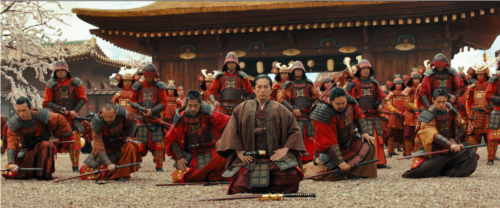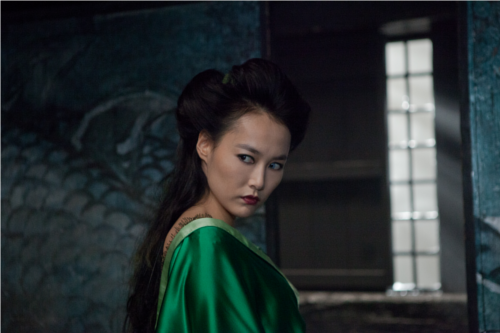 47 Ronin has a serious problem.
47 Ronin has a serious problem.
It’s being hailed as a flop on the same level as John Carter or The Lone Ranger (two films that I must admit I enjoyed once I got around to watching them) before it’s even been released in the west.
For months, worrying rumours have been circulating about the film, about a budget escalating out of control, re-shoots being required to bulk up Keanu Reeves’ role in the film, and most worrying that studio Universal had removed director Carl Rinsch from the editing suite. All signs that would point to a sub-par final product. A worse than expected box office opening in Japan and a warning to investors that the film could lose up to $125 million haven’t helped things either, however, unlike its titular warriors, 47 Ronin is not as doomed as the Hollywood press would have you believe.
Rinsch/Universal/whoever have produced a historical epic that is easy on the eye and takes its time on character and plot, although sometimes this approach is to its detriment.
The film is based upon the true Japanese story of forty seven samurai in the employ of Lord Asano of Ako, who were rendered master-less ronin upon his death after he had dishonoured himself and his house. Banished from Ako and barred from seeking retribution upon penalty of death, the ronin waited a year before unleashing their revenge against those responsible for their master’s downfall.

Due to prohibitions against the the portrayal of current events at the time, the tale of the 47 Ronin was translated into fiction as Chūshingura and many variations of the tale have been told over the years with each telling adding or subtracting details. Director Carl Rinsch himself has mentioned a Hello Kitty version in press interviews as well as another with an all female cast. His version adds a flavour of the supernatural to proceedings as well as Keanu Reeves’ Kai, a “half breed” with a mysterious mystical past who is discovered as a scarred and exhausted child by Lord Asano and a hunting party.
Adopted into his house, Kai becomes a tracker who is treated fondly by Lord Asano, but barely tolerated by his staff, including master of the Guard Oishi, (Hiroyuki Sanada who played the scheming Shingen in this year’s The Wolverine) and even less so by hot headed Yasuno (Masayoshi Haneda).

Upon a visit by the grimfaced Shogun (played by Cary-Hiroyuki Tagawa, familar to gamers as Shang Tsung in 1995’s Mortal Kombat film and Heihachi Mishima in the 2010 Tekken movie), a witch sneaks into the compound and tries to dishonour Lord Asano. First, by incapacitating his champion in a tournament with rival Lord Kira’s (Tadanobu Asano) hulking samurai, a dishonour he’s saved from by the last minute intervention of Kai, and then by bewitching Lord Asano himself.
His house dishonoured, Lord Asano is forced to commit seppuku while his samurai are branded Ronin by the shogun and banished from Ako, forbidden from seeking any revenge against the new lord of their land, Kira, upon pain of death. Knowing any fight now would only end in defeat, Oishi bids his men to wait for a year before they seek revenge, as he is exiled to a dark pit. Kai is sold into slavery and Lord Asano’s daughter Mika (Kô Shibasaki) is permitted to grieve for her father for a year in the care of the sneering Lord Kira before she must marry him.
At this stage, the story is only starting to get going, but Rinschs’s movie takes it’s time with all of this background. A more action focused film could have dealt with all this in flashback, but that would have meant missing out on the extravagant costumes, sets, and hordes of extras.

The visit by the shogun and his retinue is stunning. The physical sets and costumes are beautiful, with so much detail on screen, that some seems to be skipped over, such as the animal themed helmets of some of the assembled samurai. For some reason, these visually arresting samurai always seem to be in the background of scenes and are never focused on for long. This beauty runs throughout the film, but only let down by distracting, hazy CGI landscape shots which seem to come from another film entirely.
When Oishi is released from his dungeon after a year, the plot becomes his quest to reunite the ronin, find them weapons, and seek out Kai who it seems has some experience with the supernatural after all.
Those expecting an Asian themed 300 from 47 Ronin will be disappointed. The fantastical and the fight scenes are competently staged and always in service to the story, but at times they do lack a feeling of awe. A hulking “silver samurai” is slowly built up as something of a “mid level boss”, besting Kai in one early scene, but he is dispatched far too quickly and easily in the films climax to be satisfying. This happens a lot in the film. A conflict with mystical tengu is stripped of any wow factor and moments of brilliance, such as when Kai slashes a concrete column in half, remain in isolation and are not followed up on.
This wouldn’t make sense for the action film that seemed to be promised in the trailers, but it does for the respectful historical epic that the film aims to be. The tale of the 47 Ronin is a true one. Their graves can be visited in Japan. With a mostly Japanese cast, the film seems to err too often of the side of respect over spectacle.
Despite its lack of kick-ass action, what action sequences there are in the film are well staged, if not overly elaborate, and the cast are all excellent. Reeves isn’t given too much to do with Kai, mostly bowing in deference to those around him until they are all reduced to the same level and sharing a crush with Mika (Kô Shibasaki), one that can’t really go anywhere seeing their positions and the age they live in. Hiroyuki Sanada provides a stoic performance as the as steadfast Oishi. Rinko Kikuchi, however, is a standout. Her unnamed witch getting to show acres more range than she did in Pacific Rim, in full on villain mode, slinking about every scene she is in, torturing Mika and generally having a whale of a time.

While it’s an enjoyable tale that is well told, Christmas is an odd time to release this, as it’s doubtful it will find an audience with the Christmas crowd (Who goes to the cinema at Christmas apart from overtired parents seeking to occupy the kids for a few hours?), but fans of historical epics such as Crouching Tiger, Hidden Dragon should take the chance to see it on the big screen, if for no other reason than to prove the naysayers wrong.




